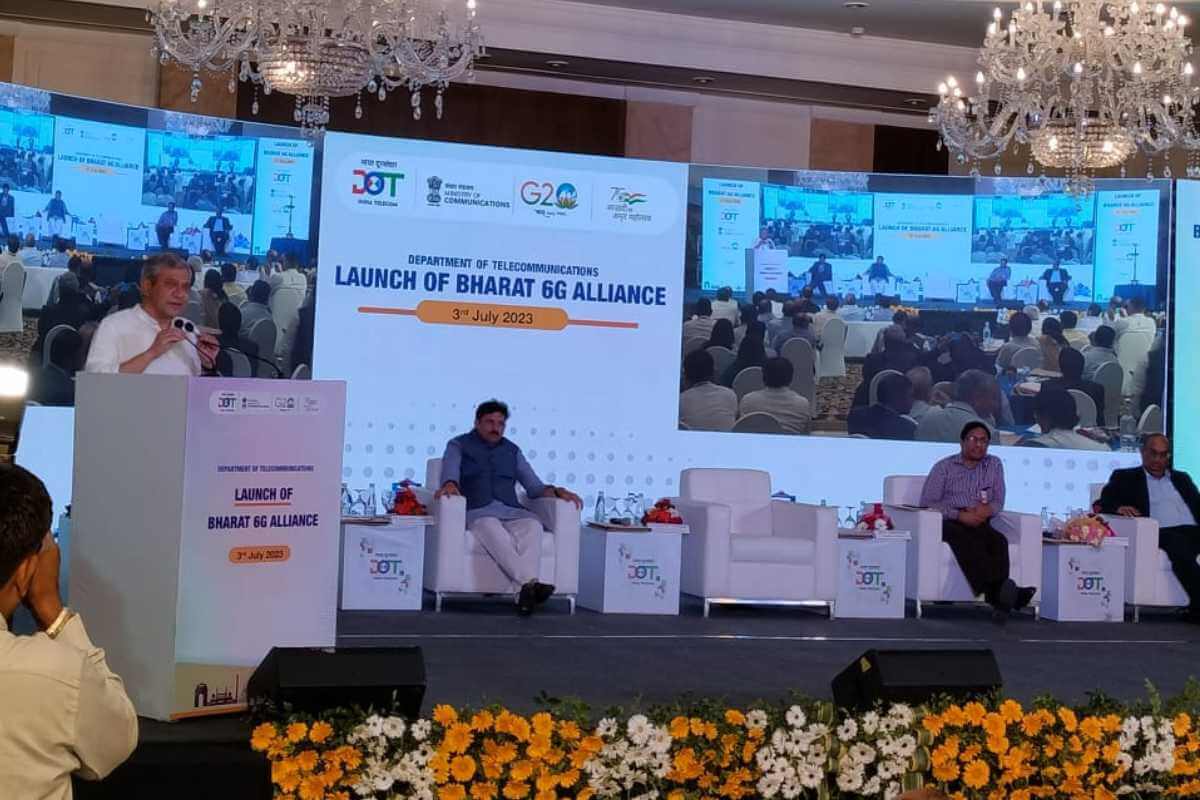
In a significant move to propel India's technological progress in the telecom sector, the Hon'ble Union Minister for Railways, Communications, Electronics and Information Technology, Shri Ashwini Vaishnaw, in the presence of Shri Devusinh Chauhan, the Hon'ble Minister of State for Communications, announced the establishment of the Bharat 6G Alliance (B6GA). This collaborative platform, consisting of public and private companies, academia, research institutions, and standards development organizations, aims to lead the development and deployment of 6G technology in India.
Also Read: Sanchar Saathi Portal Launched by Union Minister Shri Ashwini Vaishnaw
Introduction of the Bharat 6G Alliance
The launch event showcased the government's commitment to achieving universal and affordable connectivity, fostering indigenous technology, and creating a robust telecom and semiconductor manufacturing ecosystem. The formation of the B6GA aligns with the vision of Hon'ble Prime Minister Narendra Modi and marks a significant step towards India's leadership in 6G technology.
The B6GA will act as a catalyst for collaboration and knowledge exchange, forging coalitions and synergies with other 6G Global Alliances. This international collaboration will help India stay at the forefront of 6G innovation and technology development.
Funding for 6G technology projects
To support the advancement of 6G technology, the government has allocated a grant of 240.51 crores through the Telecom Technology Development Fund (TTDF). This funding will be utilized for two crucial projects: the 6G THz Testbed with Orbital Angular Momentum (OAM) & Multiplexing and the Advanced Optical Communication Test Bed.
The 6G THz Testbed project, undertaken by a consortium consisting of SAMEER, IIT Madras, IIT Guwahati, and IIT Patna, aims to explore the potential of 6G technology using terahertz frequencies and advanced multiplexing techniques. This research will pave the way for the development of cutting-edge 6G applications and services.
The Advanced Optical Communication Test Bed project, in collaboration with IIT Madras, IIT Delhi, Indraprastha Institute of Information Technology (IIIT) Delhi, and several industry players, focuses on creating an advanced test bed for optical communication technologies. This initiative will spur innovations in areas like telemedicine and telesurgery, revolutionizing healthcare services in India.
Also Read: Telecom Minister Urges Citizens to Not Pick Calls From Unknown Numbers
Digital Communication Innovation Square (DCIS) initiative
Furthermore, the government's commitment to fostering innovation and entrepreneurship was evident through the Digital Communication Innovation Square (DCIS) initiative. As part of this scheme, grants totaling Rs 48 crore were awarded to 66 startups and MSMEs. The Department of Telecommunications felicitated 75 innovators for their remarkable contributions to the field, recognizing their dedication and exceptional achievements.
Key achievements in the telecom sector
Speaking at the event, Shri Devusinh Chauhan acknowledged India's position as a bright spot in the global economy, with the telecom sector being a shining example within the country. He applauded the stakeholders for their efforts and highlighted the transparent spectrum auction, which generated over 1.5 lakh crores in a record time of 42 days. He also emphasized the rapid deployment of 2.7 lakh 5G sites within just 9 months, making India one of the fastest adopters of 5G technology globally.
Also Read: Phones Should Support Cell Broadcasting and Disaster Alerts: Govt
Shri Ashwini Vaishnaw, Minister for Communications, Railways, and Electronics and IT, credited the transformative reforms undertaken in the telecom sector over the past nine years under the leadership of Prime Minister Narendra Modi. He highlighted key achievements, such as the significant reduction in data costs from Rs 300/GB in 2014 to Rs 10/GB in 2023, the expedited process for Right of Way permission, the increase in BTS sites, and the rise in FDI in the telecom sector.
Vaishnaw also underscored India's accomplishments in 5G technology, including substantial investments and the efficient allocation of spectrum. He commended BSNL for its role in stabilizing the market and generating operating profits. India's technological prowess was further demonstrated by its technology exports to 12 countries, its filing of over 200 patents in 6G technology, and the extensive broadband connectivity provided in rural areas.
Vaishnaw mentioned the Semiconductor Mission, where India has expedited land and project approvals for Micron Technologies, highlighting the strategic partnership with the United States. He also announced the approval of five design companies, two of which will operate in the telecom sector, and emphasized India's development of advanced optical communication with zero latency, benefiting sectors like telemedicine and telesurgery.
Also Read: India Takes a Key Role in Shaping ITU’s 6G Vision Framework
Bharat 6G Alliance
With the launch of the Bharat 6G Alliance, India aims to position itself as a global leader in 6G technology and intellectual property rights (IPR). By fostering collaboration, driving indigenous manufacturing, and promoting technology co-innovation, the B6GA will accelerate India's journey towards a digital and mobile-inclusive nation.
According to the statement, the government's efforts, supported by startups, industry players, academia, and research institutes, are focused on empowering citizens through a last-mile digital revolution and rapid proliferation of mobile and digital services. These initiatives align with Prime Minister Narendra Modi's vision of Jan Anusandhaan, adding momentum to India's path to becoming a developed nation.
For more information about the Bharat 6G Alliance and the Digital Communication Innovation Square, the Ministry of Communications advised people to visit the official websites: bharat6galliance.com and dcis.dot.gov.in.















